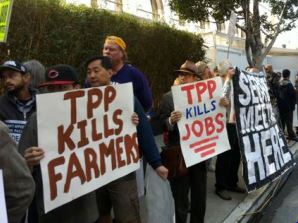Both links above from: http://mnfairtradecoalition.org/pending-trade-deals/transpacific-partnership-agreement
See also: : http://www.yesmagazine.org/new-economy/can-dracula-strategy-bring-trans-pacific-partnership-into-sunlight and http://occupytppa.wordpress.com/
Leaked texts reveal that negotiators are considering a dispute resolution process that would grant transnational corporations special authority to challenge countries' laws, regulations and court decisions in overseas tribunals that circumvent domestic judicial systems. The current Australian Labor Government has held out from agreeing to the corporate powers clauses, thus holding up the negotiations to date.
Coalition if it is elected in September, has promised to 'fast track' signing the agreement with these corporate provisions included, possibly as soon as October this year.
Where has this come from?
Washington corporate lobbyists are paid millions of dollars to lobby the US government to weaken its constraints (and those of trading nations) on their business. We know from leaked documents that oil, mining, tobacco and pharmaceutical companies have joined Wal-Mart and almost 600 other corporate lobbyists to take part in the talks, pushing through a pact that would be enforced through an international tribunal. This body would have the power to overrule domestic laws and even impose trade sanctions on governments that fail to abide by its rulings.
See Link - http://www.huffingtonpost.com/2012/06/13/obama-trade-document-leak_n_1592593.html
The current Australian Labor government has made it clear that it wants to protect Australia's sovereignty and will not support the inclusion of these corporate powers in the agreement despite immense pressure from the Australian Chamber of Commerce and Industry, Transnational corporations and the US government, but the Coalition on the other hand wants to support the agreement and fast-track its signing.
It is important to note that these draconian provisions align perfectly with Coalition ideologies. Under the similar but much smaller North American Free Trade Agreement (United States, Canada, Mexico) the reality is that federal governments are often willing to "lose" disputes with corporations in order to discipline provincial, state or municipal governments that have adopted progressive social and environmental policies. So this agreement could effectively provide Tony Abbott with an excuse for reducing 'green tape', for instance. Where a Coalition federal government may not have the legal or political power to reverse certain environmental legislation, it could instead allow the "external" intervention of the TPPA to act on its behalf.
The corporate powers (referred to as 'investor-State Dispute Settlement' (ISDS) provisions in the agreement) get their legal strength from the concept of 'regulatory expropriation'. Over the last ten years the concept of "regulatory expropriation" has become an important part of the neoliberal or "free trade" agenda. It is well known that this agenda involves breaking down barriers to trade and investment, creating more freedom for corporations to pursue profits at any social or ecological cost.
These barriers include the regulation of corporate activities by governments, such as laws on employment, environmental protection and public health. It also includes government regulation in the form of public sector services and utilities, where private industry is excluded.
These corporate powers require compensation include not only for 'expropriation' but also for acts "tantamount to expropriation". This means that a wide range of government policies, laws or administrative measures can be treated as having a similar effect as expropriation.
In this way the neoliberal attack on government regulation is combined with a very broad definition of expropriation to produce the new legal-political concept of regulatory expropriation:
Any national or subnational government regulations (laws, treaties, administrative measures, policies) which reduce or limit the value of the private commercial property can be considered a form of "regulatory expropriation."
Examples of similar free trade agreements where these provisions have been used in disputes between transnational corporations and governments:
References include the following
http://en.wikipedia.org/wiki/Metalclad
http://www.bloomberg.com/news/2013-05-09/rennert-800-million-toxic-lead-fight-roils-global-trade.html
http://aftinet.org.au/cms/node/566#
In the Australa/US free trade Agreement (AUSFTA) negotiations (under Howard), the US targeted environmental protection regulations, labelling of genetically engineered food, and rules for local media content and jobs in government purchasing. The Howard Government, like the current Gillard Government held out on agreeing to corporate powers provisions and so AUSFTA operates without them. However, all these provisions and more are again on the table under the TPPA negotiations. These US based Corporations even see Australian government rules which call for a percentage of Australian made drama on television as an infringement of their rights as corporations to enter the television market without restrictions, and would sue the government on this basis.
This is not the future. It is already happening to Australia. Philip Morris tried suing Australia in the High Court for passing the 'plain packaging Laws' for tobacco products, which were aimed at reducing health problems arising from cigarette smoking. Having failed in the High Court, Phillip Morris has now gone to a Hong Kong court to sue, basing their case on the fact that Australia has an old trade agreement with Hong Kong which contains similar 'Investor State Dispute Settlement' (ISDS) provisions which potentially allow international corporations to over-ride Australian government law. If the much more expansive TPPA (potentially the biggest trading bloc in the world) is signed off with these provisions, then there will be little to stop corporations making this a regular practice every time they bump up against Australian law.
Not only would a vast array of decisions affecting our daily lives be made in venues where Australian voters have no role, but alterations to an adopted agreement like this require consent by all signatory countries. Thus, accompanying the imposition of specific retrograde policies would be an unprecedented shift of power towards locking in corporate rule, insulated against the normal means of democratic accountability, such as elections, advocacy and public protest.
